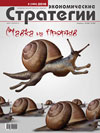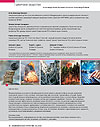Emergencies Information Management Systems
The paper addresses the issue of forming an intelligent digital infrastructure for managing the country’s economy in special conditions: global disasters, catastrophes and emergencies. The experience of creating large information systems for managing the country’s economy in a special period is evaluated. The convergent approach for creating the required system for management support is proposed. It is shown that under these conditions, high management efficiency can be achieved on the basis of special support for self-organization processes and anti-collapse self-adjusting integration of information system segments and intelligent services that are adaptable to conditions of a known, predictable and unknown nature. At the same time, the integration of network infrastructures involves the distributed processing and storage of data based on interaction and integration of various network environments, which allows to achieve previously unattainable reliability, stability and recoverability of economic management.
References:
- Ageev A.I., Smirnova V.A. Adaptivnost ’ vysokotekhnologichnogo kompleksa k tsifrovym vyzovam [Adaptability of the High-Tech Complex to Digital Challenges]. Ekonomicheskie strategii, 2018, no 1, pp. 164–166.
- Artyukhin V.V., Aref’eva E.V., Vereskun A.V. i dr. Upravlenie riskami tekhnogennykh katastrof i stikhiinykh bedstvii [Managing Risks of Man-Made Catastrophes and Natural Disasters]. Posobie dlya rukovoditelei organizatsii. Moscow, Vserossiiskii nauchno-issledovatel’skii institut po problemam grazhdanskoi oborony i chrezvychainykh situatsii MChS Rossii, 2016, 270 p.
- Volkov A.A., Shilova L.A. Obespechenie ustoichivosti ob”ektov zhizneobespecheniya v usloviyakh vozniknoveniya chrezvychainoi situatsii [Ensuring Sustainability of Life Support Infrastructure in Emergency Conditions]. Vestnik MGSU, 2014, no 4, pp. 107–115.
- Sotsiogumanitarnye aspekty situatsionnykh tsentrov razvitiya [Socio-Humanitarian Aspects of Situational Development Centers]. Pod red. V.E. Lepskogo, A.N. Raikova. Moscow, Kogito-Tsentr, 2017, 416 p.
- Dvoeglazov D.M. Zhivuchest’ i ustoichivost’ informatsionnykh sistem predpriyatii slozhnoi struktury [Survivability and Stability of Information Systems at the Enterprises with Complex Structure]. Informatsionno-tekhnologicheskii vestnik, 2015, no 3, pp. 55–68.
- Emelin V.I. Metod i matematicheskaya model’ otsenki informatsionnoi ustoichivosti v usloviyakh destruktivnykh vozdeistvii na vsem zhiznennom tsikle ASU kriticheskikh system [Method and Mathematical Model for Assessing Information Stability in the Context of Destructive Influences on the Entire Life Cycle of the Critical Systems’ ACS]. Morskaya radioelektronika, 2011, no 3, p. 40.
- Ageev A.I., Aver’yanov M.A., Evtushenko S.N. i dr. Tsifrovoe obshchestvo: arkhitektura, printsipy, videnie [Digital Society: Architecture, Principles, Vision]. Ekonomicheskie strategii, 2017, no 1, pp. 114–125.
- Dobrynin A.P., Chernykh K.Yu., Kupriyanovskii V.P. i dr. Tsifrovaya ekonomika — razlichnye puti k effektivnomu primeneniyu tekhnologii (BIM, PLM, CAD, IOT, SMART CITY, BIG DATA i dr.) [Digital Economy — Different Ways to Efficient Application of Technologies (BIM, PLM, CAD, IOT, SMART CITY, BIG DATA, etc.)]. International Journal of Open Information Technologies, 2016, no 1, pp. 4–11.
- Loginov E.L., Raikov A.N. Tsifrovaya ekonomika: uyazvimost’ k setevym atakam i vozmozhnosti obespecheniya ustoichivosti upravleniya [Digital Economy: Vulnerability to Network Attacks and the Possibility of Ensuring Management Sustainability]. Problemy rynochnoi ekonomiki, 2017, no 4, pp. 4–10.
- Aleksandrov E.Yu., Tyutyunnik V.M. Modelirovanie otsenki ustoichivosti setevoi informatsionnoi sistemy k negativnym vneshnim vozdeistviyam v usloviyakh nepolnoty apriornykh svedenii [Modeling the Assessment of Sustainability of a Network Information System to Negative External Influences in the Context of Incomplete a Priori Information]. Global’nyi nauchnyi potentsial, 2015, no 9, pp. 102–106.
- Gromov Yu.Yu., Minin Yu.V., Ivanova O.G. i dr. Zadacha poiska grupp negativnykh vneshnikh vozdeistvii na setevuyu informatsionnuyu sistemu, maksimiziruyushchikh znachenie funktsii ushcherba [The Task of Searching Groups of Negative External Influences on the Network Information System, Maximizing the Damage Function Value]. Pribory i sistemy. Upravlenie, kontrol’, diagnostika, 2013, no 3, pp. 25–30.
- Yurchik P.F., Golubkova V.B., Gusenitsa D.O. Informatsionnaya podderzhka rabotosposobnosti komp’yuternykh sistem metodami teorii katastrof [Informational Support of the Computer Systems Performance Through Catastrophe Theory Methods]. Avtomatizatsiya i upravlenie v tekhnicheskikh sistemakh, 2013, no 3, pp. 52–56.
- Dudchak V.V., Kuz’mina M.S., Mosorov K.A. i dr. Model’ sistemy upravleniya razrabotkoi produktsii voennogo naznacheniya v usloviyakh kibervoiny [Management System Model for Developing Military Products in Cyber War Context]. Teoriya i tekhnika radiosvyazi, 2013, no 4, pp. 91–95.
- Korepanova S.A., Onufrei A.Yu., Sugak V.P. Obespechenie informatsionnoi bezopasnosti putem ustoichivogo resheniya zadach upravleniya v avtomatizirovannykh sistemakh upravleniya voennogo naznacheniya [Providing Information Security Through Sustainable Solution of Management Tasks in Military Automated Control Systems]. Trudy Voenno-kosmicheskoi akademii im. A.F. Mozhaiskogo, 2016, no 652, pp. 49–58.
- Savel’ev M.I. Metodologicheskii podkhod k formirovaniyu ustoichivogo upravleniya silami i sredstvami MChS Rossii [Methodological Approach to Forming Sustainable Management of Forces and Facilities of Russia’s EMERCOM]. Tekhnologii grazhdanskoi bezopasnosti, 2014, no 3, pp. 68–70.
- Raikov A. Accelerating technology for self-organising networked democracy. ScienceDirect, Futures, 2018, October, vol. 103, pp. 17–26, available at: https://doi.org/10.1016/j.futures.2018.03.015.
- Raikov A.N. Konvergentnoe upravlenie i podderzhka reshenii [Convergent Management and Decision Support]. Moscow, IKAR, 2009. 245 c.
- Loginov E.L., Shkuta A.A. Iskusstvennyi intellekt v organakh gosupravleniya [Artificial Intelligence in Public Authorities]. Gosudarstvennaya sluzhba, 2017, no 5, pp. 24–29.
- Raikov A.N. Platforma iskusstvennogo intellekta dlya podderzhki strategicheskogo planirovaniya v srede tsifrovoi ekonomiki [Artificial Intelligence Platform to Support Strategic Planning in the Digital Economy]. Neirokomp’yutery i ikh primenenie. XVI Vserossiiskaya nauchnaya konferentsiya. Moscow, Moskovskii gosudarstvennyi psikhologo-pedagogicheskii universitet, 2018, pp. 20–22.
- Petrov A.B., Bagrov S.V., Sycheva A.I. Podkhody k obespecheniyu ustoichivoi raboty slozhnykh informatsionnykh sistem gosudarstvennogo i korporativnogo naznacheniya [Approaches to Ensure the Sustainable Operation of Complex State and Corporate Information Systems]. Vestnik MGTU MIREA, 2015, no 4–2, pp. 175–183.
- Raikov A.N. Uncaused Semantic Interpretation of Cognitive Models in Networked Decision Support Systems. Proceedings of the 11th IEEE International Conference on Application of Information and Communication Technologies (AICT2017), Moscow, 2017, September, 20–22, pp. 321–325.
- Ivutin A.N., Esikov D.O. Vychislitel’nyi klaster dlya resheniya zadach obespecheniya ustoichivosti unktsionirovaniya raspredelennykh informatsionnykh system [Computing Cluster to Meet the Challenges of Ensuring Stability of the Distributed Information Systems Functioning]. Vestnik Ryazanskogo gosudarstvennogo radiotekhnicheskogo universiteta, 2016, no 57, pp. 63–67.
- Kulikov G.G., Antonov V.V., Konev K.A. Klasternoe programmnoe obespechenie avtomatizirovannoi informatsionnoi sistemy [Cluster Software of an Automated Information System]. Vestnik Yuzhno-Ural’skogo gosudarstvennogo universiteta. Seriya: Komp’yuternye tekhnologii, upravlenie, radioelektronika, 2018, no 2, pp. 19–28.
- Trakhtengerts E.A. Setetsentricheskie metody komp’yuternogo protivodeistviya katastrofam i riskam [Network-Centric Methods of Computer Counteraction to Catastrophes and Risks]. Upravlenie bol’shimi sistemami, 2013, no 41, pp. 162–248.
- Latypova N.M. Model’ “katastrofy sborki” dlya upravleniya ustoichivost’yu ekonomicheskoi sistemy [“Catastrophe Assembly” Model to Manage the Economic System Sustainability]. Kazanskaya nauka, 2016, no 3, pp. 50–55.
- Makhutov N.A., Berman A.F., Nikolaichuk O.A. Nekotorye printsipy samoorganizatsii dlya upravleniya riskom tekhnogennykh katastrof [Some Self-Organization Principles to Manage the Risk of Man-Made Disasters]. Problemy analiza riska, 2015, no 4, pp. 6–17.
- Sineshchuk Yu.I., Pantikhovskii O.V., Sineshchuk M.Yu. Informatsionno-logicheskaya model’ analiza i obespecheniya ustoichivosti funktsionirovaniya sistem upravleniya slozhnymi organizatsionno-tekhnicheskimi ob”ektami [Information-Logical Model of Analysis and Operation Sustainability of Control Systems of Complex Organizational-Technical Objects]. Problemy upravleniya riskami v tekhnosfere, 2012, no 2, pp. 1–11.
- Ageev A.I., Loginov E.L., Efremov D.N. Gosudarstvennyi komitet po nauchno-tekhnicheskoi politike: tsentr setevoi kontsentratsii nauchno-tekhnicheskikh svyazei v klyuchevykh oblastyakh znaniya dlya integrirovannogo upravleniya v sfere nauki i tekhniki [The State Committee for Scientific-Technical Policy: Center of Network Concentration of Scientific-Technical Ties in Key Knowledge Areas for Integrated Management in the Science and Engineering Field]. Ekonomicheskie strategii, 2014, no 8, pp. 12–21.
- Dolomatov M.Yu., Karabel’skaya I.V., Kovaleva E.A. Proektirovanie IS po svoistvam i elektronnym kharakteristikam slozhnykh mnogokomponentnykh organicheskikh system [IS Designing by Properties and Electronic Characteristics of Complex Multicomponent Organic Systems]. Elektrotekhnicheskie i informatsionnye kompleksy i sistemy, 2014, no 2, pp. 68–72.
- Zapechnikov S.V. Bezopasnost’ raspredelennykh komp’yuternykh sistem pri razlichnykh strategiyakh rezervirovaniya informatsionnykh resursov [Security of Distributed Computer Systems with Various Strategies of Information Resource Backup]. Bezopasnost’ informatsionnykh tekhnologii, 2011, no 3, pp. 17–26.
- Knaub R.V. Struktura informatsionno-analiticheskoi sistemy analiza energoekologicheskikh posledstvii katastrof razlichnogo genezisa [Structure of the Information-Analytical System for Analyzing Energy-Ecological Consequences of Accidents of Various Genesis]. Ustoichivoe innovatsionnoe razvitie: proektirovanie i upravlenie, 2018, no 1, pp. 85–94.
- Esikov D.O. Metodika vybora metoda resheniya zadach obespecheniya ustoichivosti funktsionirovaniya raspredelennykh informatsionnykh system [Methods of Choosing the Mode of Solving Problems of Providing the Functioning Sustainability of Distributed Information Systems]. Elektronnye informatsionnye sistemy, 2018, no 1, pp. 65–78.
- Zotov I.V., Sazonov S.Yu., Efremova O.V. i dr. Otsenka riskov prirodnykh i tekhnogennykh katastrof v informatsionno-analiticheskikh sistemakh podderzhki prinyatiya reshenii [Assessing Risks of Natural and Man-Made Disasters in the Information-Analytical Decision Support Systems]. Izvestiya Yugo-Zapadnogo gosudarstvennogo universiteta, 2012, no 5-2, pp. 19–23.
- Kolesnikov A.A., Mushenko A.S., Dzyuba Yu.N. i dr. Sinergeticheskii nablyudatel’ peremennykh sostoyaniya v zadachakh rekonstruktsii sistem s khaoticheskoi dinamikoi [Synergetic Observer of State Variables in the Problems of Reconstructing Systems with Chaotic Dynamics]. Vserossiiskaya nauchnaya konferentsiya po problemam upravleniya v tekhnicheskikh sistemakh, 2017, no 1, pp. 58–61.
- Nechaev Yu.I., Petrov O.N. Adaptivnyi kontrol’ protsessov samoorganizatsii na osnove neirodinamicheskoi sistemy [Adaptive Control of Self-Organization Processes Based on Neurodynamic System]. Morskie intellektual’nye tekhnologii, 2018, no 2, pp. 144–152.
- Loginov E.L., Bortalevich S.I., Shkuta A.A. i dr. Podkhody k ispol’zovaniyu modeli samoorganizatsii i raspada neironno-setevykh struktur dlya povysheniya zhivuchesti informatsionnykh sistem organov gosudarstvennogo upravleniya vsledstvie prirodnykh, tekhnogennykh katastrof ili voennykh atak [Approaches to Using the Model of Self-Organization and Disintegration of Neural-Network Structures for Increasing Survivability of Government Bodies’ Information Systems as a Result of Natural, Man-Made Disasters or Military Attacks]. Vestnik Moskovskogo universiteta MVD Rossii, 2017, no 4, pp. 187–194.
- Isaev O.V., Dushkin A.V., Zol’nikov V.K. i dr. Analiz ustoichivosti funktsionirovaniya informatsionnoi struktury integrirovannoi sistemy bezopasnosti v usloviyakh negativnykh vozdeistvii [Analyzing Functioning Stability of the Information Structure of an Integrated Security System in Conditions of Negative Impacts]. Promyshlennye ASU i kontrollery, 2017, no 10, pp. 52–60.
- Kozlov V.N., Tros’ko I.U. Ustoichivye rezhimy energeticheskikh sistem na osnove upravleniya khaoticheskimi protsessami [Sustainable Regimes of Energy Systems Based on Chaotic Processes Control]. Nauchno-tekhnicheskie vedomosti Sankt-Peterburgskogo gosudarstvennogo politekhnicheskogo universiteta, 2012, no 3-1, pp. 111–117.
- Ul’yanov S.V., Nikolaeva A.V., Reshetnikov A.G. Intellektual’nye sistemy upravleniya v nepredvidennykh situatsiyakh. Optimizator baz znanii na myagkikh vychisleniyakh [Intellectual Control Systems in Unpredictable Situations. Soft Computing Knowledge Base Optimizer]. LAP Lambert Academic Publishing, OmniScriptum GmbH & Co. KG 2014.
- Ul’yanov S.V., Reshetnikov A.G., Reshetnikov G.P. Tekhnologii intellektual’nykh vychislenii. Kvantovye vychisleniya i programmirovanie v samoorganizuyushchikhsya intellektual’nykh sistemakh upravleniya [Intelligent Computing Technologies. Quantum Computing and Programming in Self-Organizing Intelligent Management Systems]. Ucheb.-metodich. posobie. Dubna, Izd-vo OIYaI, 2015.
- Raikov A. Convergent networked decision-making using group insights. Complex & Intelligent Systems, 2015, December, vol. 1, issue 1, pp. 57–58.
- Berman A.F. Informatika katastrof [Computer Science of Catastrophes]. Problemy bezopasnosti i chrezvychainykh situatsii, 2012, no 3, pp. 17–37.
- Emel’yanova Yu.P. Ustoichivost’ nelineinykh povtoryayushchikhsya protsessov s vozmozhnymi narusheniyami [Stability of Nonlinear Repetitive Processes with Possible Violations]. Nauka i obrazovanie, Moscow, Izd-vo MGTU im. N.E. Baumana, 2014, no 4, pp. 398–415.
- Dmitrishin D.V., Usov A.V., Khamitova A.D. Ogranicheniya primenimosti lineinogo upravleniya s zapazdyvayushchei obratnoi svyaz’yu v nelineinykh diskretnykh sistemakh [Limitations of Applicability of Linear Control with Delayed Deedback in Nonlinear Discrete Systems]. Vestnik Khersonskogo natsional’nogo tekhnicheskogo universiteta, 2015, no 3, pp. 36–42.
- Ignat’ev M.B., Katermina T.S. Upravlenie khaosom i neopredelennost’ [Chaos Management and Uncertainty]. Mezhdunarodnaya konferentsiya po myagkim vychisleniyam i izmereniyam, 2016, t. 2, sektsii 4–7. Saint Petersburg, Izd-vo LETI im. V.I. Ul’yanova (Lenina), 2016, pp. 318–321.



